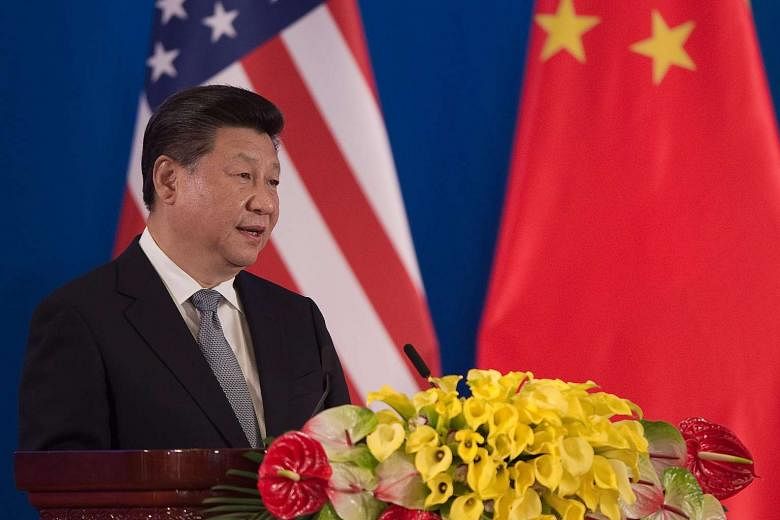South Korea has sent its top nuclear envoy to Beijing a week after a North Korean delegation met Chinese President Xi Jinping, amid speculation that a summit between Mr Xi and North Korean leader Kim Jong Un could be next on the cards.
Mr Kim Hong Kyun, South Korea's Special Representative for Korean Peninsula Peace and Security Affairs, met his Chinese counterpart Wu Dawei on Wednesday, mainly to find out what was discussed at Mr Xi's 20-minute meeting with North Korean official Ri Su Yong, a trusted aide of Mr Kim.
The meeting on June 1 was significant as it marked the first time since 2013 that Mr Xi met a North Korean envoy, and it came after a period of strained relations between the two sides due to Pyongyang's pursuit of nuclear weaponry despite being urged by Beijing to denuclearise.
Both sides expressed hopes to strengthen their friendship and cooperation, reported Chinese and North Korean media. But they remained divided on Pyongyang's nuclear ambitions, with Mr Ri saying the North would continue to pursue economic and nuclear development, while Mr Xi reiterated China's position against nuclear weapons in the Korean peninsula.
Still, it was telling that Mr Xi met Mr Ri despite the North firing a missile just hours before Mr Ri's visit. Analysts had expected Mr Xi to cancel the meeting, said Dr Lee Seong Hyon of South Korean think-tank Sejong Institute.
He said the two traditional allies are making an effort to mend their strained relations, driven to act as their rivals have stepped up efforts to win over their friends.
China's rival, the United States, has reached out to China's friends Vietnam and Mongolia.
North Korea's rival, South Korea, meanwhile has been exerting diplomatic pressure on countries friendly with the North, including Cuba and Uganda, to abide by toughened UN sanctions imposed on the North in March for its nuclear and missile tests in the past several months.
It is not known who initiated the meeting, but there is "motivation from both sides" to have a successful meeting, Dr Lee said.
For Pyongyang, the move is aimed at avoiding international isolation and seeking relief from UN sanctions. China, despite its anti-nuclear stance, is still North Korea's biggest economic lifeline.
"China also has an interest to get closer to North Korea, as China feels that the US is trying to contain the rise of China and reduce room for China to act in East Asia by stealing China's friends one by one," he said.
Washington's intervention in China's territorial disputes with neighbours in the South China Sea has somehow driven China towards protecting North Korea, which acts as a buffer between China and US forces stationed in its ally South Korea, said analysts.
Beijing also feels threatened by talks between Washington and Seoul to deploy the anti-ballistic missile system Terminal High Altitude Area Defence to South Korea, even though the US has said the move is aimed at blocking North Korean missiles.
South Korea, meanwhile, was worried enough to send its nuclear envoy to Beijing to find out more.
He was told that China voiced its "strong opposition" to the North's provocations and affirmed its commitment to enforcing toughened UN sanctions, reported Yonhap news agency.
There was no mention of a summit between Mr Xi and North Korea's Mr Kim Jong Un. The two leaders have not met since Mr Kim assumed power after his father Kim Jong Il's death in late 2011.
There was recent speculation in the media that the summit could take place later this year or early next year.
Dr Kongdan Oh of the Institute for Defence Analyses think-tank feels that the timing is just right for a Xi-Kim summit, and that Mr Xi may be willing to host the meeting in Beijing.
"Pyongyang has been using all kinds of tactics to confuse, distract and disturb its neighbours, including its most important ally, China," she said, adding that after a period of chilly relations, it was time for it to change its manner of dealing with China. "It's nothing surprising."
She added that China has to deal with North Korea "as long as it wants some kind of buffer and China-reliant regime near its border".
However, Dr Lee believes both sides are "not in a hurry" for their leaders to meet, unless driven to act by pressure from the US.
"If China feels that US effort to contain China is getting severe and intense, China will make the strategic move to invite Kim Jong Un to Beijing as an international warning to the US," he added.

